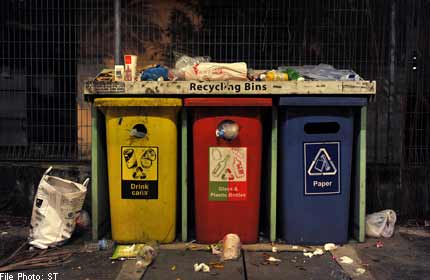
SINGAPORE - I refer to the letters by Mr Teo Keng Chuan ("S'poreans need to put more effort into recycling"; July 15), Singapore Environment Council executive director Jose Raymond ("Make recycling part of our culture"; last Thursday) and Mr Raju M. Iyer ("Refundable deposit a great idea"; last Thursday).
Under the National Recycling Programme launched in 2001, households were given recycling bags, and fortnightly door-to-door collection was carried out.
The programme was enhanced in 2011 by providing recycling bins to all landed households and replacing door-to-door collection for HDB households with one recycling bin for every HDB block.
This allows residents to deposit their recyclables into the bins at their convenience, without having to keep their recyclables for two weeks before collection takes place.
The frequency of collection from the bins was increased to weekly for landed households and thrice weekly for HDB flats.
The enhanced programme was implemented on July 1 this year in the Clementi sector, to coincide with the start of the new public waste collection contract there.
The segregated bins Mr Teo referred to are the public recycling bins located in non-residential public areas, where recyclables deposited by passers-by tend to be single items such as plastic bottles or aluminium cans.
Residential areas are provided with commingled recycling bins as the recyclables deposited by households tend to be a mix of different waste types.

These are then collected and sorted at a material recovery facility.
The National Environment Agency (NEA) adopts a multi-pronged approach to encourage recycling.
Besides holding community events to educate the public on the 3Rs (Reduce, Reuse, Recycle), we also collaborate with schools to promote recycling among students.
Public waste collectors also have programmes, such as "Cash for Trash", to incentivise recycling.
The recycling programmes that NEA has launched can be found at www.nea.gov.sg
As Mr Raymond has highlighted, it will be mandatory from next year for large hotels and shopping malls to report the amount of waste they generate, as well as formulate waste minimisation plans and reduction targets.
The NEA will consider extending this to other premises if the outcome is positive.
We are also exploring other waste minimisation and recycling options, including deposit refund schemes, as mentioned by Mr Raju.
While such schemes are effective in reducing beverage containers entering the waste stream, there is an administrative cost to manage the schemes and this cost may be passed on to consumers.
The costs and benefits of such schemes will have to be evaluated to ensure they are viable and cost-effective before implementation.
Ong Soo San
Director, Waste and Resource Management Department
National Environment Agency

Get a copy of The Straits Times or go to straitstimes.com for more stories.

